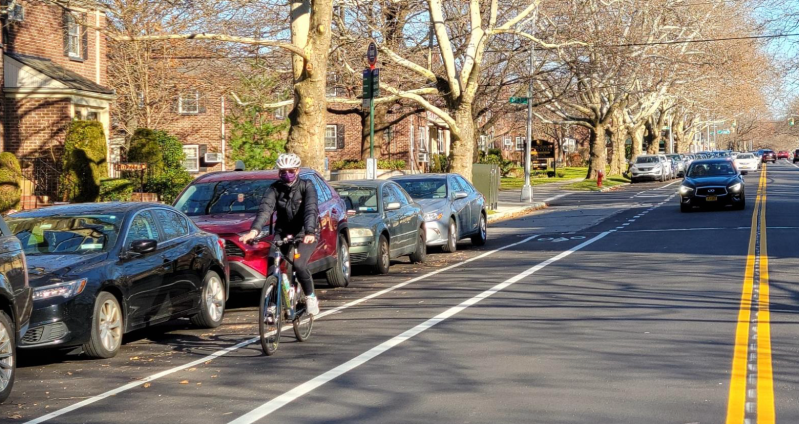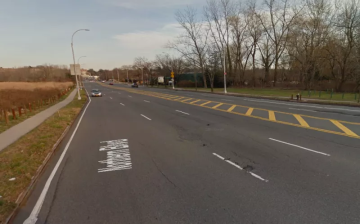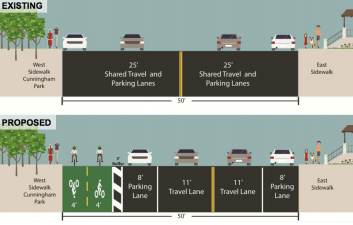Panel Votes Down Eastern Queens Bike Lanes — But DOT Says it Will Move Forward

A contentious plan for protected bike lanes in a verdant part of eastern Queens lost a full community board vote on Monday — but the Department of Transportation said it would proceed with the plan anyway.
The proposed bike network in Community Board 11 (encompassing Auburndale, Bayside, Douglaston, Little Neck, Hollis Hills and Oakland Gardens) had already narrowly failed in an August Transportation Committee vote, but the DOT said it is moving ahead, albeit with more community input, according to Deputy Queens Borough DOT Commissioner Albert Silvestri, who presented at the meeting.
“We look forward to proceeding with this important community-requested project that will improve safety for all road users with new protected bike lane connections to parks and the [proposed Eastern Queens] Greenway,” said DOT spokesman Scott Gastel. “Its traffic calming elements will address vehicular speeding and cut-through traffic on local streets.”
The plan will create protected bike lanes in a five-square-mile wedge of Bayside and Oakland Gardens between the Cross Island and Utopia parkways:
- 26th Avenue (from Utopia Parkway to Bell Boulevard, almost 1 mile),
- Corporal Kennedy Street (from 26th to 33rd avenues, 0.5 miles),
- 53rd Avenue (from Underhill Avenue to Oceania Street, 1.1 miles),
- Oceania Street (from 46th Avenue to the Horace Harding Expressway, 0.8 miles),
- 46th Avenue (from Oceana Street to Cloverdale Boulevard, 1 mile).
That’s about nine miles the way the DOT counts protected bike lanes (back and forth). The plan also includes some regular painted bike lanes and shared lanes, neither of which provide substantial protection.

The plan would also add a miles-long “calm” corridor with a lower speed limit and pedestrian-safety improvements on residential 33rd Avenue. But the removal of parking from some streets antagonized some residents — and the lack of true connections among the protected lanes rankled others.
In the end, DOT couldn’t make everyone happy: The motion to support the plan got more yeses than nos, but failed to gain a majority among the members present and, as such, was defeated.
“There are those who think it goes too far; there are those who think it doesn’t go far enough,” Transportation Committee Chairman Victor Dadras told Streetsblog.
Transportation Alternatives had lobbied for the plan.
“Cycling is growing in Eastern Queens and DOT’s plan addresses the board and the community’s requests for protected lanes,” said one of its Queens organizer, Laura Shepard, for whom the vote was personal — she grew up in the neighborhood, and her mother didn’t let her bike certain places, such as to school, because of the lack of safe passages. “We commend the transportation committee’s work with DOT to identify safe and direct routes through the community. A lot of time and thought went into the process and the result would help a new generation of cyclists access their schools and parks, while making streets safer for everyone. We hope DOT will move forward with these projects.”
The bike network in Eastern Queens is important not just for the area, but for the whole city. The verdant area could be very bike friendly but for the fact that it is bounded by some of the most dangerous, noxious highways: the Long Island and Clearview expressways, and Grand Central and Utopia parkways. Meanwhile, Northern and Francis Lewis boulevards are where the majority of the neighborhood’s seven crashes per day happen.
Local safe-streets activists seek to calm traffic in the area not only in order to save lives but also to create safe bike connections among the greenswards for the benefit of all New Yorkers. The area has lovely parks, including Alley Pond Park, Cunningham Park, and the car-free Vanderbilt Motor Parkway, along with the Queens waterfront, an impressive nature preserve.
Yet speaker after speaker at the community board could not imagine that they as motorists and homeowners could or should share local roads with cyclists.
“I live on 33rd Avenue. It’s the wrong place for a bike lane,” said one speaker, complaining about the “lack of outreach” in a process that already has solicited hundreds of opinions over several years. Several speakers, of course, rejected any diminution of parking — even in one case in which a speaker had to be reminded that it’s illegal for residents to park on sidewalks and in medians.
For bike activist and dad John Kelly, a Transportation Committee member who said he was speaking in his personal capacity, the DOT’s plan — and its deferential approach — were lacking.
“The DOT’s back and forth with the community board is unlike how any other agency works,” he said. “It’s a bad strategy, since it wastes resources and delays even minor improvements for years, and final results are often worse than the original proposals. We’ve been talking about this specific plan for well over a year and it only has two protected bike lanes; it’s not a ‘network’ as people are saying.”
The failure to pass a vote, he added, “will only delay the process further, and every day later means more people will be injured or killed.”


